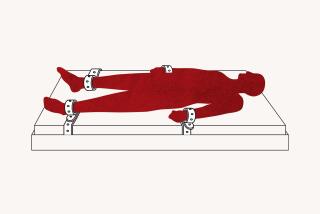Hospitals Falling Into Line : Chicago Medical Center Follows Smokeless Trend
- Share via
CHICAGO — As of April 1, no one at University of Chicago Medical Center will be allowed to light up a cigarette without a note from a doctor.
“And we don’t expect that to happen very often,” said Kenneth Bloem, the center’s executive vice president.
The decision to “go smoke-free” at the three-hospital, 654-bed medical complex was a natural one, Bloem said, even if it comes 25 years after the U.S. surgeon general declared smoking hazardous to the health.
After years of restraint and even tacit approval--there was a time when cigarettes were a big seller in hospital gift shops--more and more health facilities are clamping down on smoking.
A recent survey found that nine out of 10 hospitals nationwide now severely restrict smoking in their facilities and that 8% of them ban the habit outright unless it is prescribed by a doctor.
‘Proud to Be a Leader’
The poll of 774 hospitals also found that 3% of hospitals will also no longer employ smokers on their staffs, although most will either pay for or subsidize cessation programs to help employees quit.
“We are simply part of a trend but we are proud to be a leader in this move toward a smoke-free society,” said Stuart Westbury Jr., president of the American College of Healthcare Executives, which conducted the poll.
If hospitals seem a bit tardy on attacking the nation’s No. 1 killer, it is because “hospitals are a very public place,” Westbury said. “It is not easy to simply say ‘no smoking’ with the number of people--many of them under tremendous stress--who use the facility each day as patients or visitors.”
The change has come primarily because society is changing, Westbury said, with nonsmokers now successfully demanding smoke-free transportation, public places and work areas. Hospitals, like other businesses, also are beginning to realize that a no-smoking policy is not only better for employee and customer health but for the bottom line as well.
“In straight economic terms, a smoker can cost an employer $4,000 more a year” in health costs, absenteeism, accidents and damage to equipment, Westbury said. “In a hospital, it can also harm patients who are in a weakened state anyway.”
Ban Is Absolute
The question that remains is whether a no-smoking policy will work at a facility as large and varied as the Chicago Medical Center. Bloem said the ban will only be enforced with verbal reprimands during its first few months after implementation and he hopes that stronger measures will not be necessary.
But he emphasized that the ban is absolute. The only exception would be a patient in a private room who has received a written order from a physician.
At the 489-bed St. Cloud hospital in St. Paul, Minn., a similar smoking ban has been in effect since November and fewer than 10 patients have received physician permission to smoke, said hospital President John Frobenius.
Such orders are usually given to accommodate dying patients or patients whose short-term health would be harmed by the anxiety of trying to quit while in the hospital, Frobenius said.
More to Read
Sign up for Essential California
The most important California stories and recommendations in your inbox every morning.
You may occasionally receive promotional content from the Los Angeles Times.













